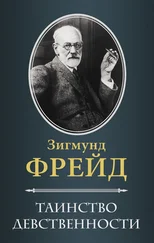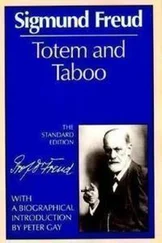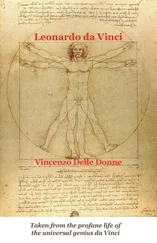When he later made the effort to return from his investigations to the art from which he started he felt that he was disturbed by the new paths of his interest and by the changed nature of his psychic work. In the picture he was interested above all in a problem, and behind this one he saw emerging numerous other problems just as he was accustomed in the endless and indeterminable investigations of natural history. He was no longer able to limit his demands, to isolate the work of art, and to tear it out from that great connection of which he knew it formed part. After the most exhausting efforts to bring to expression all that was in him, all that was connected with it in his thoughts, he was forced to leave it unfinished, or to declare it incomplete.
The artist had once taken into his service the investigator to assist him, now the servant was stronger and suppressed his master.
When we find in the portrait of a person one single impulse very forcibly developed, as curiosity in the case of Leonardo, we look for the explanation in a special constitution, concerning its probable organic determination hardly anything is known. Our psychoanalytic studies of nervous people lead us to look for two other expectations which we would like to find verified in every case. We consider it probable that this very forcible impulse was already active in the earliest childhood of the person, and that its supreme sway was fixed by infantile impressions; and we further assume that originally it drew upon sexual motive powers for its reënforcement so that it later can take the place of a part of the sexual life. Such person would then, e.g., investigate with that passionate devotion which another would give to his love, and he could investigate instead of loving. We would venture the conclusion of a sexual reënforcement not only in the impulse to investigate, but also in most other cases of special intensity of an impulse.
Observation of daily life shows us that most persons have the capacity to direct a very tangible part of their sexual motive powers to their professional or business activities. The sexual impulse is particularly suited to yield such contributions because it is endowed with the capacity of sublimation, i.e., it has the power to exchange its nearest aim for others of higher value which are not sexual. We consider this process as proved, if the history of childhood or the psychic developmental history of a person shows that in childhood this powerful impulse was in the service of the sexual interest. We consider it a further corroboration if this is substantiated by a striking stunting in the sexual life of mature years, as if a part of the sexual activity had now been replaced by the activity of the predominant impulse.
The application of these assumptions to the case of the predominant investigation–impulse seems to be subject to special difficulties, as one is unwilling to admit that this serious impulse exists in children or that children show any noteworthy sexual interest. However, these difficulties are easily obviated. The untiring pleasure in questioning as seen in little children demonstrates their curiosity, which is puzzling to the grown–up, as long as he does not understand that all these questions are only circumlocutions, and that they cannot come to an end because they replace only one question which the child does not put. When the child becomes older and gains more understanding this manifestation of curiosity suddenly disappears. But psychoanalytic investigation gives us a full explanation in that it teaches us that many, perhaps most children, at least the most gifted ones, go through a period beginning with the third year, which may be designated as the period of infantile sexual investigation . As far as we know, the curiosity is not awakened spontaneously in children of this age, but is aroused through the impression of an important experience, through the birth of a little brother or sister, or through fear of the same endangered by some outward experience, wherein the child sees a danger to his egotistic interests. The investigation directs itself to the question whence children come, as if the child were looking for means to guard against such undesired event. We were astonished to find that the child refuses to give credence to the information imparted to it, e.g., it energetically rejects the mythological and so ingenious stork–fable, we were astonished to find that its psychic independence dates from this act of disbelief, that it often feels itself at serious variance with the grown–ups, and never forgives them for having been deceived of the truth on this occasion. It investigates in its own way, it divines that the child is in the mother's womb, and guided by the feelings of its own sexuality, it formulates for itself theories about the origin of children from food, about being born through the bowels, about the rôle of the father which is difficult to fathom, and even at that time it has a vague conception of the sexual act which appears to the child as something hostile, as something violent. But as its own sexual constitution is not yet equal to the task of producing children, his investigation whence come children must also run aground and must be left in the lurch as unfinished. The impression of this failure at the first attempt of intellectual independence seems to be of a persevering and profoundly depressing nature. [23] For a corroboration of this improbable sounding assertion see the "Analysis of the Phobia of a Five–year–old Boy," Jahrbuch für Psychoanalytische und Psychopathologische Forschungen, Bd. I, 1909, and the similar observation in Bd. II, 1910. In an essay concerning "Infantile Theories of Sex" (Sammlungen kleiner Schriften zur Neurosenlehre, p. 167, Second Series, 1909), I wrote: "But this reasoning and doubting serves as a model for all later intellectual work in problems, and the first failure acts as a paralyzer for all times."
If the period of infantile sexual investigation comes to an end through an impetus of energetic sexual repression, the early association with sexual interest may result in three different possibilities for the future fate of the investigation impulse. The investigation either shares the fate of the sexuality, the curiosity henceforth remains inhibited and the free activity of intelligence may become narrowed for life; this is especially made possible by the powerful religious inhibition of thought, which is brought about shortly hereafter through education. This is the type of neurotic inhibition. We know well that the so acquired mental weakness furnishes effective support for the outbreak of a neurotic disease. In a second type the intellectual development is sufficiently strong to withstand the sexual repression pulling at it. Sometimes after the disappearance of the infantile sexual investigation, it offers its support to the old association in order to elude the sexual repression, and the suppressed sexual investigation comes back from the unconscious as compulsive reasoning, it is naturally distorted and not free, but forceful enough to sexualize even thought itself and to accentuate the intellectual operations with the pleasure and fear of the actual sexual processes. Here the investigation becomes sexual activity and often exclusively so, the feeling of settling the problem and of explaining things in the mind is put in place of sexual gratification. But the indeterminate character of the infantile investigation repeats itself also in the fact that this reasoning never ends, and that the desired intellectual feeling of the solution constantly recedes into the distance. By virtue of a special disposition the third, which is the most rare and most perfect type, escapes the inhibition of thought and the compulsive reasoning. Also here sexual repression takes place, it is unable, however, to direct a partial impulse of the sexual pleasure into the unconscious, but the libido withdraws from the fate of the repression by being sublimated from the beginning into curiosity, and by reënforcing the powerful investigation impulse. Here, too, the investigation becomes more or less compulsive and a substitute of the sexual activity, but owing to the absolute difference of the psychic process behind it (sublimation in place of the emergence from the unconscious) the character of the neurosis does not manifest itself, the subjection to the original complexes of the infantile sexual investigation disappears, and the impulse can freely put itself in the service of the intellectual interest. It takes account of the sexual repression which made it so strong in contributing to it sublimated libido, by avoiding all occupation with sexual themes.
Читать дальше









